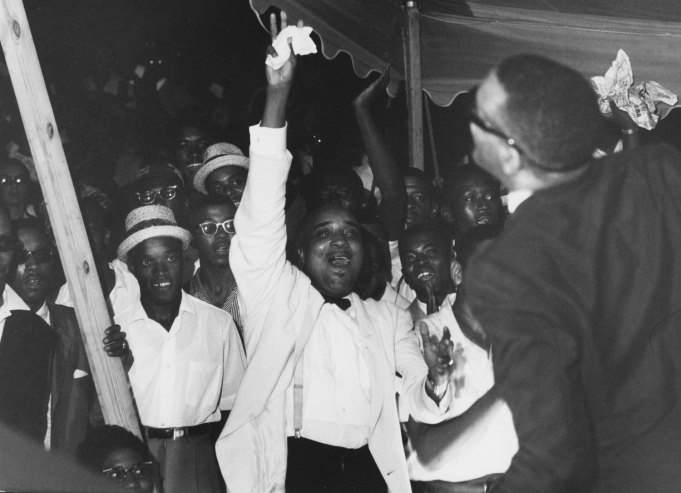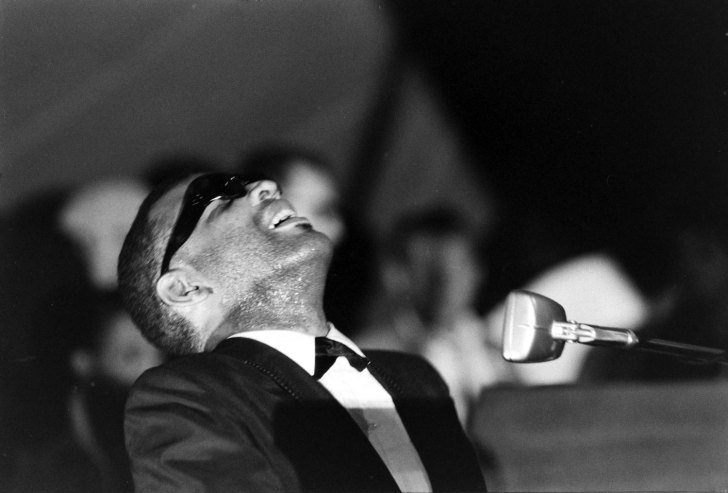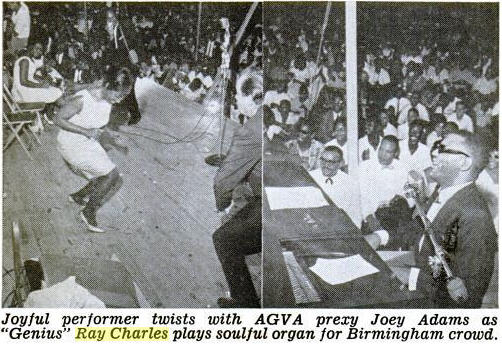Ray Charles Live At Salute To Freedom (1963)


I’ve written a few times about Ray Charles’ position and actions against racism. One of these actions was his contribution to Salute To Freedom, a concert against segregation, held on 5 August 1963 in Birmingham, the capital of U.S. racism in the 1960s. Today I found a contemporary article that I will quote below because it looks as if it may disappear from the web anytime soon.
It’s a fascinating read, mainly depicting the hero’s role – in almost biblical terms – of comedian and AGVA president Joey Adams.
Another alibi to publish it here is because one of the last paragraphs carries proof that a number of news organizations filmed at the event. Some of that footage must have survived. Who knows more?
The article, Neither heat, bombs, nor Birmingham cops shall stop the show – it must go on, was written by Leo Shull, and published in Show Business, Vol. XXIII, no. 32 (10 August 1963), pgs. 1, 10:
Two invasion planes flew into Birmingham, Alabama, Monday August 4 and captured the city. “They captured the right people, too,” said Reverend Martin Luther King, “the Negroes and whites who are fighting to attach Birmingham and the whole South to the United States of America.” Joey Adams, President of AGVA, had decided to integrate Birmingham for the entertainment industry.
The first plane of show people drafted by Adams had 76 aboard. “The Spirit of 76,” said Joey, who had conceived, produced and financed the show and was now the den mother & nursemaid to the apprehensive collection of talent. The second plane departed afterwards and had Ray Charles and his orchestra, crewmen and staff. Mr. Charles and his manager [formally: Ray’s booking agent, BS], Milt Shaw, with Stan Seidenberg [another agent, BS], had chartered and paid for this plane.
In the first aircraft with Joey Adams were his wife, Cindy, and stars, celebrities, newspapermen, Life and Sat Eve[ning] Post and other photographers, disc jockeys and commentators of radio and TV stations, plus several hundred pounds of food and drink, donated to Mr. Adams and his Salute to Freedom riders by Max Asnas, Stage Delicatessen. The planes were paid by donations which Mr. Adams got from Northerners, including $500 from Radio City Music Hall, Maurice Uchital ($2,500); David Dubinsky of ILGWU ($500); Jacob Potofsky of the Hatmakers’ Union ($250), Union official Harold Gibbons ($1,000) AGMA ($200) and Int’l Building Trades ($200) plus many smaller contributions.
To dare say, and a Yankee at that, that an integrated show would be smuggled into Birmingham to encourage Negroes and whites to integrate into a black and white audience was like waving a red flag in front of a bull O’Connor—an intolerable insult.
The enemy camp decided to meet it with volleys of silence, from the Mayor of the city, the police, political figures and the Birmingham press which never printed a stick of linotype before or after the event.Blackout.
The police and Mayor had refused protection, because “this was the first integrated show and audience in the history of Birmingham,” declared Rev. A. D. King, brother of Martin Luther, who had organized 500 volunteers to deal with the local problems and preparations, including ticket sales for the show.
Taxi drivers had refused to transport the show’s cast and personnel. Rev. King then collected a caravan of 50 private-car volunteers. Hotels had refused lodgings; Adams got a motel, run by A.G. Gaston, former Negro undertaker and now owner of the motel, the local Negro bank and Negro insurance company to provide lodgings. Restaurants refused service. Adams brought along his own food. The city theatre and auditorium owners had refused a meeting hall.
Adams and King got a Negro college campus. There were no chairs. Adams issued a radio call via Negro disc jockey in Birmingham asking people to carry their own – on the night of the show, for three miles people could be seen walking to campus, carrying their own chairs – they had also paid $5 per ticket to see the show.
There was no stage nor lights.
“Build one, buy lights,” said Adams. “I’m sending a check for the lumber, lights and electricians. And don’t spend a cent of the ticket sales, keep it all to pay for ‘The March to Washington Aug. 28,’ I’m paying all expenses for this ‘Sale to Freedom in Birmingham.'”
Threatening calls and letters, promises of bombings, riots and physical injury all failed to deter the group or the show which went on 9 pm and lasted for five hours. Klu Kluxers and white violence groups began to hold meetings.
Joey Adams had collected for his production Johnny Mathis, Nina Simone, comedian Al Bernie, writers James Baldwin and Harry Golden, Dick Merson, assistant director of News; Billy Taylor and Wm. B. Williams of WNEW; Paul Duke, magician; Billy Rowe, former NYC Deputy Police Coor., now Joe Louis’ partner, and Conrad Buckner, dancer, the Gamm Sisters, The Raelettes, Clyde McPhatter, The Shirelles, Dick Gregory, Magid Triplets, the Alabama Christian Movement Choir of 150, the whole orchestra of The Harlem Apollo Theatre led by its conductor, Reuben Phillips. The Alabama musicians union refused to permit Negro and white musicians to play in the same stage.
The cast and crew got off the plane, had lunch at the Gaston motel, then went to a nearby hall and began rehearsals with the orchestras. Sid DeMaye, of AGVA, began co-ordinating the stage routine.
Meanwhile in New York and over press wires the story began to go out. The radio stations from the North began phoning in for progress reports. The newsmen and photographers – about 50 – began work. So did Cleveland Robinson, chairman of the “March on Washington Committee,” Clarence Jones of the Ghandi Society.
On the campus, Dr. Lucious H. Pitts, president of Miles College, had mustered volunteer students and alumni to prepare an organization of ushers, service personnel; the carpenters and roof-makers, lighting men and technicians were working in the 98 degree heat – an unusually hot day.
Civilian defense guards had been gathered to take over the protection job that the police refused and had always given to all other public gatherings – and these Negro volunteers came with shot guns to protect the audience from Klu Kluxers who had paraded a few days earlier in protest against the show.
Makeshift floodlights had been set up to light the way for the ticket buyers and to show up any lurking hoodlums or invaders. There were no toilet or rest room facilities, no water, since the field was about a half mile from the college, and five miles from the center of town…
Altho the show was not scheduled till about nine, the audience began to come at noon. Adams had expected 5,000; more than 20,000 people bought tickets, and brought chairs. Many white ticket agencies accepted tickets for sale, a new first.
The Negro people, who had reason to dislike whites, treated the Salute to Freedom members with generous welcome and affection. The response to the show at times was deafening, and great roars greeted many of the acts and the quips of MC Adams, Rev. Martin Luther King, Joe Louis. Adams made a point of publicly embracing many Negro members of the local committees, a sight that would have caused instant arrest a few months ago. The Negroes watched with disbelief and amazement as Negroes and whites chattered, worked and mingled on stage and at the Gaston Motel (which had been bombed a few months ago when they found that Martin Luther King was sleeping on the second floor. A wall of new bricks replaces the old shattered one). Some Negroes asked if they could walk on the street with white members of the show; never seen in Birmingham before.
NBC and other television companies had brought their cameras, as did many of the film newsreel companies.
White and Negroes sitting and eating together became the big photo catch for Negro photographers shooting for Southern Negro newspapers and magazines. More than a dozen Negro disc jockeys journeyed to Miles College and were introduced on the stage. They had been broadcasting this coming event for weeks.
Said James Baldwin to the audience: “This is a living, visible view of the breakdown of a hundred years of slavery – it means that white man and black can work and live together. History is forcing people of Birmingham to stop victimizing each other.”
The only member of the United States Government or any of the fifty states to acknowledge there was a new kind of integration drive, was NY’s Senator Jacob Javits. He sent a telegram to Joey Adams saying: “Congratulations to all those participating in this significant variety show, my warmest praise goes out to you for this inspiring show which deserves the support of all America interested in freedom and human dignity. Birmingham is an appropriate site for this event. I think this will become the symbol of the breakthru so long awaited and tell the people present I will work to overcome the Senate filibuster to bring civil rights this year.”
About four hours after the show began as Johnny Mathis began his song, the stage collapsed and fifty people were hurled down, some of them struck by the falling lumber. The whole field went dark. Electricians restored lights in about a half hour, the audience stayed, the show went on. One man with two broken legs, and the other wounded were taken to hospitals.
The noise of the crash made people think a bomb had gone off, some jumped, John Mathis dove for the floor. (This writer was thrown clear to the grass below.) One of the Magid Triplets was injured, but he did his turn later anyhow. Orchestra instruments were broken, they will be paid for from the $10,000 fund Joey Adams raised.
Upon the return trip, a warning came that a bomb was on one of the planes. It was searched, then all plane riders were halted at the airport gate and questioned, some searched for possible bomb or weapon. The Ray Charles plane flew off. Then the 76 on the second plane embarked. At 5 am it took off. At 9 am it landed at LaGuardia, New York City, U.S.A., Aug. 6, nineteen sixty three.
For a wider perspective on the event and Ray’s role, also read this, this, this, this, this, this, and this.
For the later controversy around Ray’s concerts in South Africa, read this.
This is how the great Billy Taylor remembered the day:
Also read this article.
Life (Time) has made these photos (not published before) public:

 |
| Photos by Grey Villet. |



Comments
Bob Stumpel — 2012-12-02 00:09:06
Dubin — 2012-12-01 20:30:04